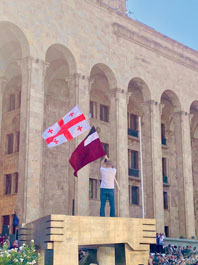When Shame replaces Pride: Far-right rally disrupts Tbilisi Pride’s March of Solidarity
By Veronika Malinboym
Tuesday, July 6

Earlier this morning, Prime Minister Irakli Garibashvili gave a speech at the government meeting, condemning the Pride’s initiative and stated that this event was arranged by the country’s opposition and the former president Mikheil Saakashvili with a clear aim to ‘destabilize society’, which the government of Georgia ‘would not allow’. What unraveled after Garibashvili’s speech will forever go down in the country’s history as a ‘shame’ that replaced the Pride.
Members of radical ultra-right groups, including the Union of Orthodox Parents and Unity, Essence, Hope civic movement founded recently by Levan Vasadze, an ultra-nationalist politician and businessman known for his homophobic statements, gathered in front of the Parliament building. Here, they began to dismantle the tents put up by the opposition politicians several months ago as a protest against the results of the October 2020 Parliamentary Elections.
When the journalists arrived at the scene, they became a target for verbal abuse and violent attacks, often while reporting live. As a result, several journalists had to be hospitalized with serious injuries, many had their equipment destroyed.
Police were mobilized in front of the Parliament, where the far-right rally was taking place, however, they failed to prevent the attacks, or make any arrests. Such inaction of the law enforcement agents is what made many believe that the government silently encouraged the violent disruption of the scheduled march.
As the situation escalated, and when far-right groups went out in the city chasing down anyone with LGBT+ symbols, beating them up, and even stabbing one of the tourists for wearing an earring, Tbilisi Pride was forced to cancel its event out of security concerns. Many news outlets made the decision not to cover the events in order to protect their journalists when the police couldn’t.
The rally went on until the late evening - with hate speech being transmitted from the microphones, interrupted only by fireworks, folk music, a child reciting poems, and the symbolic burning of the LGBT flag. The smokes were flying high, and people’s chanting ‘Sakartvelos Gaumarjos’ (long live, Georgia) was piercing the air.
Thirty MEPs sent an open letter to the Georgian government demanding to ensure the safety of the Pride participants, the Prime Minister responded with his controversial statement that ultimately led to the far-right rally on the steps of Georgia’s Parliament. It is, therefore, hard to believe that the European integration, that Georgia is striving for so, is possible at all in the near future.
Journalists were targeted and attacked in front of the main legislative body of the country, with police unable to protect them. Tbilisi Pride’s main event ended up being a screening of a documentary movie, that seems was only highly protected by the police cordons since various diplomatic corps were attending it.
President Zurabishvili visited the injured at the hospital and condemned violence against minorities in her interview with media representatives.
